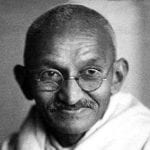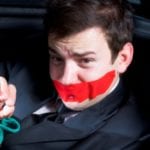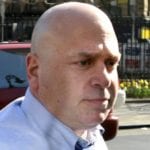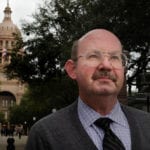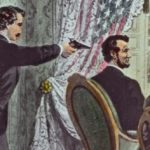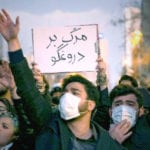 Movies and TV
Movies and TV  Movies and TV
Movies and TV  History
History 10 Wars That Sound Made Up (but Absolutely Happened)
 Movies and TV
Movies and TV 10 Movie Adaptations That Ruined Everything for Some Fans
 History
History 10 Dirty Government Secrets Revealed by Declassified Files
 Weird Stuff
Weird Stuff 10 Wacky Conspiracy Theories You Will Need to Sit Down For
 Movies and TV
Movies and TV 10 Weird Ways That TV Shows Were Censored
 Our World
Our World 10 Places with Geological Features That Shouldn’t Exist
 Crime
Crime 10 Dark Details of the “Bodies in the Barrels” Murders
 Animals
Animals The Animal Kingdom’s 10 Greatest Dance Moves
 Movies and TV
Movies and TV 10 Box Office Bombs That We Should Have Predicted in 2025
 Movies and TV
Movies and TV 10 Movie Franchises That Started Dark but Turned Surprisingly Soft
 History
History 10 Wars That Sound Made Up (but Absolutely Happened)
 Movies and TV
Movies and TV 10 Movie Adaptations That Ruined Everything for Some Fans
Who's Behind Listverse?

Jamie Frater
Head Editor
Jamie founded Listverse due to an insatiable desire to share fascinating, obscure, and bizarre facts. He has been a guest speaker on numerous national radio and television stations and is a five time published author.
More About Us History
History 10 Dirty Government Secrets Revealed by Declassified Files
 Weird Stuff
Weird Stuff 10 Wacky Conspiracy Theories You Will Need to Sit Down For
 Movies and TV
Movies and TV 10 Weird Ways That TV Shows Were Censored
 Our World
Our World 10 Places with Geological Features That Shouldn’t Exist
 Crime
Crime 10 Dark Details of the “Bodies in the Barrels” Murders
 Animals
Animals The Animal Kingdom’s 10 Greatest Dance Moves
 Movies and TV
Movies and TV 10 Box Office Bombs That We Should Have Predicted in 2025
10 Bizarre Ways People Tried To Start Their Own Country
At one point or another we’ve all probably fantasized about running our own country. But we’re also mostly sane enough to recognize that actually trying to make that dream a reality would be an exercise in futility—it’s not like you can just click over to eBay and get a deal on a used city-state and a second-hand army. But that hasn’t stopped some unorthodox thinkers from trying to throw off the shackles of the modern world (read: “having to pay taxes”) and start their own country from scratch. And as you might have guessed, some of those proposed new countries ended up being pretty darn weird. Just take:
10The Shadowy Brotherhood Of LSD Island

William Mellon Hitchcock was an unusual hippy. Born into an enormously wealthy family (his uncle, Andrew Mellon, was one of the richest men in American history), he received a trust fund worth around $15,000 a week. In the ‘60s, he trained as a securities broker and sauntered right into a highly-paid job at Lehman Brothers.
But what his new bosses probably didn’t realize was that Hitchcock had already found his calling in life—the new wonder drug called LSD. He even turned his luxurious family estate in upstate New York over to the legendary psychedelic activist Timothy Leary. The mansion soon filled up with New Age dropouts, tripping on acid and partying the night away, while Hitchcock carried on his high-profile business dealings from the relative safety of the guest cottage. By 1967, Leary had left for California, the estate was divided between at least three feuding “acid sects,” and Hitchcock was starting to go off the deep end.
Evicting the hippies from his estate, Billy Hitch (as he was now known) followed Leary out to California, where he incorporated a tax-exempt religious entity called “The Brotherhood of Eternal Love.” A weird mixture of New Age artists and neo-Nazi Hell’s Angels, the Brotherhood established a commune south of Laguna Beach. There, they built labs, hired chemists, and were soon running the largest LSD trafficking ring in the world, producing half of the acid in America.
As the money rolled in, Hitchcock used his financial knowhow to launder the cash through a series of Swiss and Bahamian bank accounts. Some of the cash went to New Age causes, such as hiring the Weather Underground to smuggle Leary out of the country after he escaped prison. But most of the money was earmarked for the Brotherhood’s most ambitious scheme—they were going to form a new country, based around the search for enlightenment and LSD.
The Brotherhood’s target was Clipperton, a tiny island in the Pacific whose terrifying, Lord of the Flies-style history we’ve already covered. While an island best-known for the horrifying deaths of its inhabitants may not seem like the best place to take acid, the Brotherhood was determined. Their new country would become the center of the global LSD movement—as well as a tax-haven and money-laundering facility—and guide the world into a new age of peace and love.
To this end, Hitchcock sent an emissary to buy the island from the French government. Unfortunately the first guy he sent simply stole his money and fled into Europe. Then, a Swiss money-laundering investigation wiped out most of the Brotherhood’s profits. Hitchcock was arrested in the US, where he cut a deal to testify against the rest of the Brotherhood in exchange for a reduced sentence. The commune disbanded and the dream of LSD Island died with it.
9Michael Oliver I: Minerva Rising

Remember the name Michael Oliver, because you’re going to be hearing it a lot.
History’s most dedicated nation-builder, Oliver was a Lithuanian immigrant turned millionaire Las Vegas developer and a committed ultra-conservative libertarian. In his 1968 book A New Constitution for a New Country, Oliver explained how America was heading for a “complete collapse,” followed by an “onslaught of totalitarianism.” His solution was to found a new country, based on the principles of extreme laissez-faire capitalism.
Oliver’s proposed new country would operate on the gold standard and have no taxes, government regulations, or welfare. Teaming up with a number of other libertarian millionaires, Oliver set his sights on the isolated Minerva Reefs, located south of Tonga in the Pacific Ocean, and unclaimed by any existing country.
Now if Bioshock taught us anything, it’s that letting a deranged libertarian tycoon create his model society in the middle of the ocean is a bad idea, but that wasn’t going to stop Oliver. Nor would any of the other problems that soon cropped up. For a start, the Minerva Reefs were unclaimed for a reason—the tiny outcrops were underwater for most of the day. Undaunted, Minerva hired barges to ship loads of sand from Australia and dump them out on the reefs, in the hope of raising them above sea level. He also sent a couple of his followers out to wade onto the reefs and raise their newly designed flag.
On January 19, 1972, Oliver declared the Republic of Minerva an independent country, promising, “People will be free to do as they damn well please. Nothing will be illegal so long it does not infringe on the rights of others. If a citizen wishes to open a tavern, set up gambling, or make pornographic films, the government will not interfere.”
And that’s when the second problem reared its ugly head. The King of Tonga wasn’t that happy with a new country suddenly appearing on his doorstep, especially since he had heard about Oliver’s supposed Mafia connections. Just five days later, the King claimed Minerva was his territory and the Tongan army landed on the reefs, dislodging the few settlers trying to scratch out a living there. Oliver’s dream was over—for now.
8The Island Of Corporate Criminals
As a teenager, Robert Vesco set himself three goals: “Get out of Detroit, be president of a corporation, and become a millionaire.” Twenty years later, Forbes would name one of the richest Americans. The article simply listed his occupation as “thief.”
Vesco’s rise began when he conned his way into control of a New Jersey tool manufacturer, which he stripped of its assets, using the profits to start his own investment firm. He became the toast of Wall Street, boasting of being the only man other than the President to have a private Boeing 707—complete with a disco and sauna, and named Silver Phyllis because its passengers were sure to catch syphilis from the cabin crew. In 1973, he fled the US after investors discovered he had bilked them of at least $224 million (over a billion dollars in today’s money) enough to make him one of the richest men in the world.
The money made Vesco untouchable—Costa Rica, where he hung out for a while, passed a law specifically banning his extradition—and gave him more time to focus on his true passion: founding his own country. During the early ‘70s he’d already led a cabal of mobsters, US intelligence agents, and neo-fascist sugar planters attempting to split the Azores Islands away from Portugal and turn them into an offshore gambling center. Now, in exile, he was able to step things up a notch.
Vesco’s dream was to found a nation exclusively for the benefit of white-collar criminals like himself—there would be no taxes and no barrier on laundering money from oversees. After failing in bids for islands off Haiti, the Bahamas, and Costa Rica, he settled on the Caribbean island of Barbuda, where he intended to set up “The Sovereign Order of Aragon.” In exchange for a large fee, every citizen would get a knighthood and protection from whatever criminal charges they were facing in their home country. Sadly for Vesco, the deal fell through after the Barbudans objected. He eventually moved to Cuba, where he was thrown into prison after trying to con Fidel Castro’s nephew.
7Michael Oliver II: Attack On Abaco

Vesco wasn’t the only deranged millionaire cruising the Caribbean looking for an island of his own—everyone’s favorite libertarian messiah, Michael Oliver, had also turned his eyes to the region. But Oliver had learned from his Minervan fiasco. This time, when he founded his anti-government promised land, he was going to make sure he had the muscle to back it up.
Oliver’s new targets were the Bahamian Abaco Islands. Long ignored by the government in Nassau, the news that the Bahamas were to become independent from Britain caused a huge flare-up of discontent. Oliver and his wealthy buddies seized on the opportunity and began funding a separatist group called the Abaco Independence Movement. They also hired an ex-CIA mercenary named Mitchell Werbell, whose resume included an attempted invasion of Haiti, with support from CBS News in exchange for exclusive broadcast access to the fighting. Werbell’s job was to arm and train a revolutionary force capable of securing Abaco’s independence. For his part, Oliver began sending his acolytes out to the Bahamas to host seminars on libertarianism for the increasingly unenthusiastic islanders.
To Oliver’s frustration, his grand schemes began falling apart once again. First, while the Abaco revolutionaries were happy to take his money, they had never been that keen on his plan to turn their islands into a tax-haven and center for pornography distribution. When they discovered that their real goal of remaining a British colony was doomed (a British Minister actually shouted at their emissary: “We just want to be rid of you, rid of you, we want to get rid of the colonies!”) their support quickly waned. The plan fell apart for good when Werbell was arrested for selling illegal weapons—to Robert Vesco.
6The Sovereign Ecclesiastical Dominion Of Melchizedek

In 1995, California financial regulators started investigating an entity calling itself Bankasia AG. In the process, they uncovered the weirdest case of their lives. Warned against operating without a banking license, Bankasia produced mountains of paperwork showing it had been licensed in the Dominion of Melchizedek, a small South Pacific nation that operated as a theocracy similar to Vatican City. There was just one problem: The Dominion didn’t appear to exist.
The tiny atoll it claimed as its capital was underwater at high tide and one of its senior officials was listed as Harvey Penguini of Rockefeller Plaza, South Antarctica. Melchizedek’s President, a convicted con artist living in Redwood, California, responded to the investigation by declaring “spiritual warfare” on California’s Deputy Attorney General, informing him, “I will do metaphysical battle with you in your dream state. And if you interpret your dreams correctly you will know that I am the victor.”
Investigators are still working through the labyrinthine backstory of the Dominion, but some details have now become clear. The nation was the brainchild of a father-son conman team named David and Mark Pedley, who intended it to operate as a “mothership,” issuing fake passports, banking licenses, and other official documents to fraudsters worldwide. The pair wrote the Melchizedek “bible,” laid claim to an island in the Philippines, and started claiming to own 10 percent of the world’s oceans. After David died (or possibly faked his own death) in a Mexican jail, Mark changed his name to Branch Vinesdresser, then to Tzemach Ben David Netzer Korem and started floating fake government bonds.
What’s surprising about the Dominion is just how successful it was. Dominion-registered banks were granted licenses to operate in Indiana and Washington DC. In Hong Kong, a conman claiming to be the Crown Prince of the Dominion succeeded in drawing US $318,000 on his “Melchizedek bank accounts.”
Melchizedek passports and other documents began turning up in fraud cases around the world. In Texas, a Dominion-based insurance company bilked customers out of millions in phony policies. The Dominion even succeeded in becoming officially recognized by Burkina Faso and the Central African Republic. Not bad for a country founded by Branch Vinedresser and Mr. Harvey Penguini.
5The KKK Invasion Of Dominica

1981 was a bad time to be a member of the KKK. Membership was falling, funding was drying up, and the US government was cracking down on the organization. So some of the nation’s preeminent racists teamed up with Canadian neo-Nazis to do the only logical thing—conquer a Caribbean island and start their own horrifying new nation.
They initially picked Grenada as their target, figuring the US wouldn’t care much if that island’s left-leaning government was overthrown, but then a stroke of luck changed their plans. The Prime Minister of Dominica, Patrick John, had been forced to step down after a series of widespread protests swept the island. Now, he was looking to regain power—even if it meant working with the KKK. John also introduced his new friends to the Dreads, an extremist Rastafarian group living in Dominica’s mountainous interior. Weirdly, the two groups, white supremacist and Pan-Africanist, agreed to work together.
The KKK’s plan was to pose as CIA agents to hire a boat in New Orleans. They would then sail to Dominica, meet up with the Dreads, and violently overthrow the government. John would be installed as a figurehead while the Klan ruled from behind the scenes, using their new status to set up lucrative gun-running and cocaine smuggling businesses. The Dreads would be quietly disposed of and Dominica would become a safe haven for Aryan nationalists everywhere. What the island’s overwhelmingly black population would think of this idea doesn’t seem to have crossed their minds.
As you might expect, the scheme went wrong almost immediately. First of all, the invasion force assembled in New Orleans reached a grand total of 10 men. Then, the ship’s captain they tried to hire, failing to buy the “we’re totally from the CIA, please ignore our swastika tattoos” routine, reported them to the government. Everyone involved was deservingly arrested.
4Michael Oliver III: Things Get Really, Really Weird
By 1979, everyone’s favorite Andrew Ryan-wannabe, Michael Oliver, had twice failed to establish his libertarian utopia. Most people would probably have given up at that point. But most people weren’t Michael Oliver. And while his first attempts were pretty weird, his third nation-building project reached a new level of bizarre.
Oliver’s new ally was Jimmy Stevens, a former bulldozer operator who had become a leader of the John Frum cargo cult on the Vanuatuan island of Espiritu Santo. A messianic figure, noted for his flowing white hair, long robes, and harem of beautiful wives, Stevens was charismatic enough, but he was easily manipulated by the fanatics of Oliver’s Phoenix Foundation. At a Melbourne hotel, the staff were moved to laughter by the guests’ grandiose talk of revolution, as well as Stevens’ insistence that everyone refer to him as “the King.”
But Oliver were deadly serious. By 1980, he’d spent over $250,000 supplying arms to Stevens’ cultists. The newly independent Vanuatuan government started making a series of ominous discoveries—a supposed “rescue boat” for Indonesian refugees was revealed to be full of sophisticated electronic spy equipment, crewed by mercenaries, and owned by the Phoenix Foundation. Phoenix personnel were seen organizing rallies of Stevens’ supporters. Stevens himself returned from a trip to America to meet Oliver loaded down with gold coins, flags, and “passports” for his planned new nation.
After Stevens’ badly lost an election in November, Phoenix, now headquartered in Amsterdam to avoid US prosecution, was ready to act. Stevens returned from another trip to the US accompanied by a Carson City lawyer named Thomas Eck and declared war. Armed cultists rampaged through Espiritu Santo, kidnapping the district commissioner and forcing 2,000 government loyalists to flee into exile. The Vanuatuan government, increasingly desperate, was forced to call on neighboring Papua New Guinea for help—which the New Guinea government happily granted, sending hundreds of soldiers to Vanuatu and shooting Stevens’ son dead as he tried to run a roadblock.
Devastated, the cult leader surrendered, unconvincingly arguing that he “never intended for anyone to be hurt.” With Stevens downfall, the Phoenix Foundation lost the last of its power. As late as 1995, Michael Oliver was insisting that raising a new island out of the sea was “easy” and the best way to found a new country. But the dream was dead . . . at least for Oliver.
3The Atlantis Project

Yes, as it turned out, the vision of a high-tech libertarian homeland safely hidden away in the ocean didn’t quite end with the Phoenix Foundation.
Eric Klien was a Vegas software engineer who made a small fortune playing the stock market and retired at age 25. After a few months “lying around playing video games,” Klien became involved with the local libertarian movement. When their preferred candidate lost a State Senate election in 1993 (Klien insists electoral fraud was involved), a like-minded group of anti-government activists decided to go slightly more ambitious. The organization they founded was called The Atlantis Project, and its goal was the construction of a floating island nation off the coast of Panama. Inexplicably named Oceania, after the horrifyingly dystopian state in George Orwell’s 1984, the floating paradise was to be “a peaceful dolphin” compared to the “shark-like” US government.
It might sound bizarre, but Klien and his associates were deadly serious. An Internet campaign raised around $100,000 and an eminent Swedish architect built a scale model of the new super-state. A constitution was also drawn up, pledging that hospitals would have the right to turn off life support if patients could no longer afford care, that all elections would include an option for “remove this office,” and noting that government aid and charities were “compassion at gunpoint.” The project seems to have petered out at the moment—but you can be sure Klien still hasn’t given up on the dream.
2The Global Country Of World Peace

The Maharishi Mahesh Yogi was the founder of Transcendental Meditation and leader of a worldwide new religious movement. But he’s probably best known for a brief period in the ‘60s, when he served as the Beatles spiritual guru. Such is life.
But the Maharishi didn’t just fade away after the Beatles grew disillusioned with his teachings (Ringo famously left after 10 days). In 2000, he founded the Global Country of World Peace (GCWP), a “spiritual country without borders” aiming to bring peace to the world’s trouble spots. To this end, the GCWP carried out such surefire war-ending schemes as dispatching 1,400 spiritual guides to Cambodia, Nicaragua, and the Middle East and persuading the President of Mozambique to have the country’s military spend 20 minutes a day meditating. The group also attempted to control the performance of the Israeli stock exchange through meditation.
But the GCWP wasn’t content to remain a theoretical country for ever—they wanted to be the real deal. In 2001, the group tried to buy 2,500 hectares of land from Suriname to establish a sovereign nation. In exchange they offered to create $1.3 billion in investment and 10,000 new jobs (how they planned to do this remains unclear).
After Suriname politely refused, they tried to buy one of the North Mariana islands from the US and succeeded in getting the South Pacific nation of Tuvalu to consider letting them establish a “Vatican-like sovereign city-state” next to their airport. In 2002, the group was politely asked to leave Costa Rica after it was discovered they had been offering a local Amerindian group $250 a month each to accept a GCWP-appointed king. The Global Country doesn’t seem to have made any more grabs for sovereignty since then—but who can say what the future holds?
1Fela Kuti And The Kalakuta Republic

In 1970, the legendary Afrobeat musician Fela Kuti returned to his homeland of Nigeria. It didn’t go well. Kuti was overwhelmingly popular among ordinary Nigerians, but his defiant attitude and licentious lifestyle infuriated the country’s oppressive military government. By 1974, he was in a Lagos prison, charged with marijuana possession and the corruption of minors. The communal cell he was housed in was nicknamed “the Kalakuta Republic,” after a Swahili word for “rascal.” The experience didn’t faze Kuti at all; he later declared, “If rascality is going to get us what we want, we will use it; because we are dealing with corrupt people, we have to be ‘rascally’ with them.”
On his release, Kuti moved to a fortified commune in Lagos, which included accommodation, a health clinic, and a state-of-the-art recording studio. He satirically named his new home after his own prison cell, and declared “the Kalakuta Republic” an autonomous zone for all persecuted Africans–independent from the laws and jurisdictions of Nigeria. The Republic soon numbered well over 100 “citizens.”
This was not received well by the Nigerian authorities or President Olusegun Obasanjo. Kuti, ever the free spirit, affected to be unconcerned, and for a while his fame prevented the government from moving against his new country-within-a-country. Then, in 1976, Kuti released his famous album Zombie, which mocked the Nigerian military, comparing them to zombies blindly following orders. The record was a huge hit—which only made the inevitable reprisal much, much worse.
Shortly after the album’s release, over 1,000 soldiers surrounded the Kalakuta republic, which Kuti had defended with an electrified fence. When he insisted that Kalakuta was independent territory, the army cut off his power, burnt his generator with kerosene, and opened fire with machine guns and mortars, before storming the compound. Kuti’s mother was thrown to her death from a window, and Kuti himself was severely beaten. When a subsequent inquiry cleared the army of all responsibility, Kuti dropped his mother’s coffin off in front of the local barracks and left his home for exile in Ghana.
Alex is the tyrannical President, and only citizen, of the Celestial Khanate of the Couch. Follow him on Twitter.

